Grapefruit Interaction With Certain Medications For Kidney Disease
Chronic kidney disease (CKD) is a complex condition that may be challenging to manage. It’s important for those with kidney disease to take special care when considering their diet and lifestyle choices, as certain foods may interact negatively with their medications.
One example of this is grapefruit, which has been linked to adverse reactions when taken with certain medications. In this article, we'll explore the interaction between grapefruit and medications commonly taken by people with kidney disease. Understanding ckd and diabetes medications has to start somewhere!
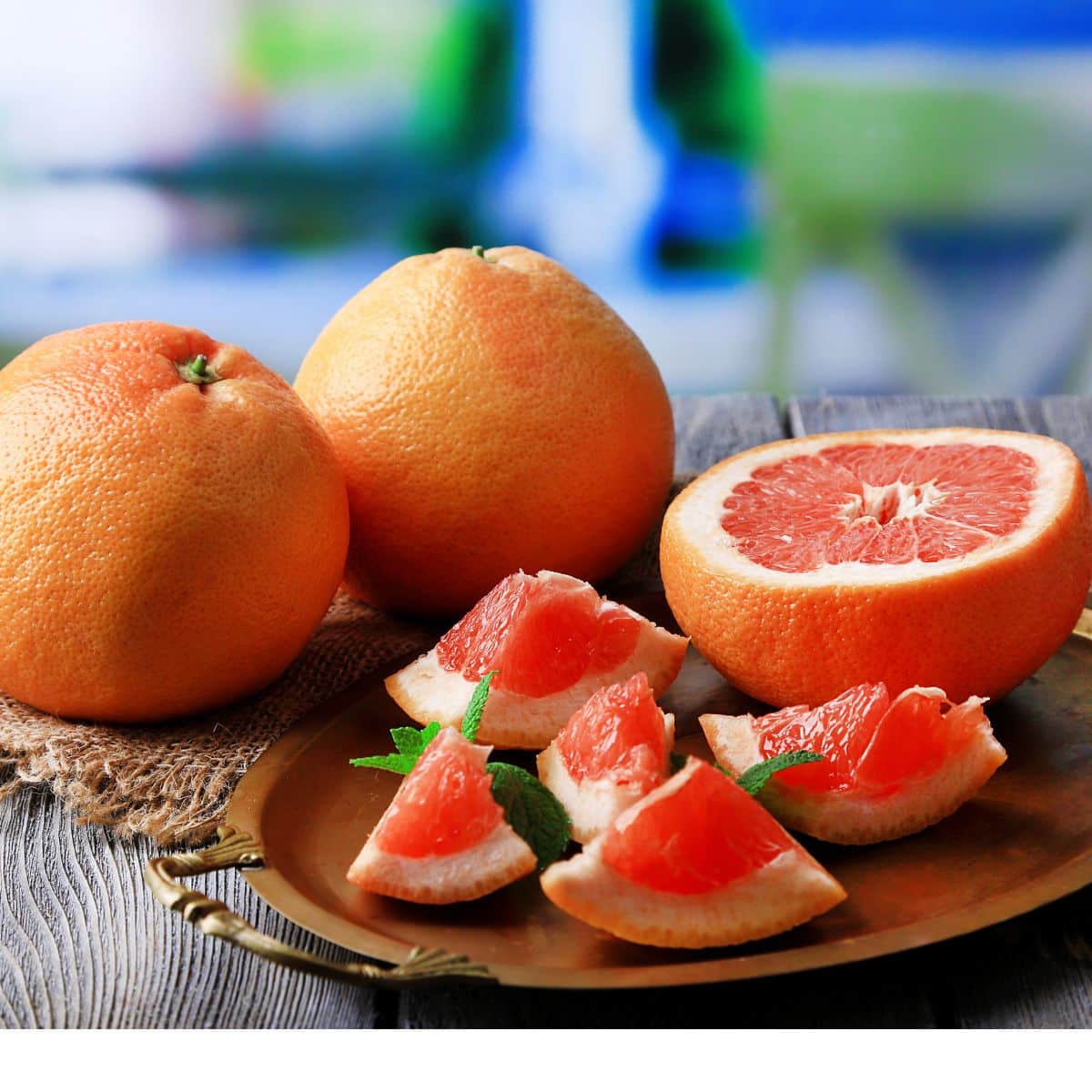
Jump to:
- What Is Chronic Kidney Disease?
- What Are The Potential Dangers Of Grapefruit-Medication Interactions?
- What Medications Are Affected By Grapefruit?
- How Can I Avoid Interactions With Grapefruit?
- What Should I Do If I Experience Symptoms Of An Interaction?
- Are There Any Other Foods That Interact With Medications?
- FAQs for Grapefruit Kidney Disease and Medications
- Grapefruit Interacts With Many Medications
What Is Chronic Kidney Disease?
Chronic kidney disease is a serious health condition that affects millions of people around the world.
Did you know that at least 37 million Americans suffer from chronic kidney disease? That’s an alarming number, but taking steps to reduce your risk and catch it early can help improve your overall quality of life.
CKD is a condition in which the kidneys have sustained irreversible damage over time, causing reduction in its functions and leading to a buildup of waste products in the body.
The signs and symptoms of kidney disease are often difficult to spot, making early detection important.
Common indicators include puffiness on eyes or face, difficulty sleeping, extreme fatigue, swelling in ankles or feet, a decrease in urination output, blood pressure increase and persistent itching all over the body.
If left untreated, these symptoms can worsen overtime and may lead to more severe complications and eventually progress to kidney failure.
Knowing what puts you at greater risk for developing kidney disease is key to prevention. Risk factors include diabetes, high cholesterol levels, hypertension (high blood pressure), family history of kidney problems and age (over 60).
Diagnosing kidney disease involves having a physical exam done by a kidney doctor along with urine tests, blood tests and imaging like ultrasound or MRIs.
Treatment options vary depending on severity of the condition but usually consist of prescription drugs combined with lifestyle changes such as reducing sodium intake and increasing water consumption.
For More Recipes and Ideas --->> Get Your Free Meals and Recipes That Are Perfect for Pre-Dialysis Diets, Pre-Dialysis with Diabetes, or Dialysis Diets.
What Are The Potential Dangers Of Grapefruit-Medication Interactions?
How does grapefruit and CKD work? It has long been established that certain medications interact with grapefruit juice and concomitant consumption of drugs with this fruit is often not recommended in clinical practice.
The effects of grapefruit juice can be a strong one and lead to more interaction between medications.
That's one of the reasons that many hospitals do not even place grapefruit juice on their menus, because of the myriad of medications that can be affected by it.
Let’s look at some of these potential dangers.
Side Effects
When considering the potential dangers of grapefruit-medication interactions, it's important to understand the side effects associated with this type of interaction.
One of the potential dangers of grapefruit-medication interactions is the side effects that can occur when this fruit interacts with certain common medications. These can range from mild nausea to severe side effects like muscle damage and gastrointestinal bleeding.
As many drugs are metabolized in the body by enzymes that can be inhibited or enhanced by certain components found in grapefruit juice and other citrus fruits, any combination may lead to dangerous side effects.
For instance, a patient taking cholesterol medication might experience clinical consequences like muscle damage if they consume large quantities of grapefruit juice.
Likewise, those on blood pressure medications should avoid ingestion of grapefruit as it could cause a significant drop in their blood pressure levels.
It is also important to take into consideration alternative treatments and diet advice when dealing with these types of drug combinations.
If a person finds themselves frequently consuming grapefruit while using medications, then consulting with their doctor about possible alternatives may help reduce the risk of adverse health effects.
Additionally, adjusting one’s dietary habits may provide benefits as well since abstaining from high citric acid foods such as oranges and limes can prevent negative reactions with certain drugs.
Patients should always follow dosage recommendations closely and talk to their doctor before making any changes to their current diet or medication regimen.
By being aware of potential drug interactions and following guidelines for safe use, individuals can better manage any health condition without experiencing unwanted side effects caused by combining medications with citrus fruits like grapefruit.
Drug Interactions
Another potential danger is that grapefruit can interact with certain medications, especially those used to treat kidney disease. This interaction can reduce the effectiveness of the medication or increase its toxicity.
Drug interactions are an important factor to consider when it comes to grapefruit-medication interactions.
So what mechanism of interaction in this case?
Normally, the medications you take and the chemicals that are in them are only absorbed at about a 50% rate. So, if it's 100 mg of the active ingredient, your body normally only absorbs about 50 mg of that medication or less.
These drugs interact with CYP3A4 enzymes in the intestinal tract for absorption. The grapefruit juice you drink interacts with that enzyme and causes it not to be effective.
So suddenly, your body is able to absorb over 50% of that medication. So you're getting higher blood levels of the active ingredient than a normal person would who didn't drink grapefruit juice or eat fresh grapefruit.
Hence, there is increased drug bioavailability with grapefruit consumption. That's where the damage can occur because your body has a higher concentration of that medication.
When there is higher bioavailability after consumption of grapefruit, the actions of drugs can be exaggerated, leading to side effects which are actually avoidable consequences.
That medication in concentrations higher than their usual quantity in terms of therapeutic blood concentrations can affect your kidneys.
Your kidneys process some of the drugs you take and make them inactive in your body so a larger amount of that drug may damage your kidneys by overwhelming the capacity that they have to inactivate medications.
Basically you took a 100 mg pill and you absorbed more than 50 mg (which is what your doctor expected you to absorb), and that amount can cause damage over time or if it's a marked increase, can cause profound damage fairly quickly.
That is where the damage from grapefruit juice or grapefruits can occur - not with the juice itself, but with the interaction and increased absorption and activity of medicines used.
With this knowledge in hand, those looking into how best to manage their medications should seek out expert advice from their doctors before making any dietary alterations that could potentially yield unfavorable results.
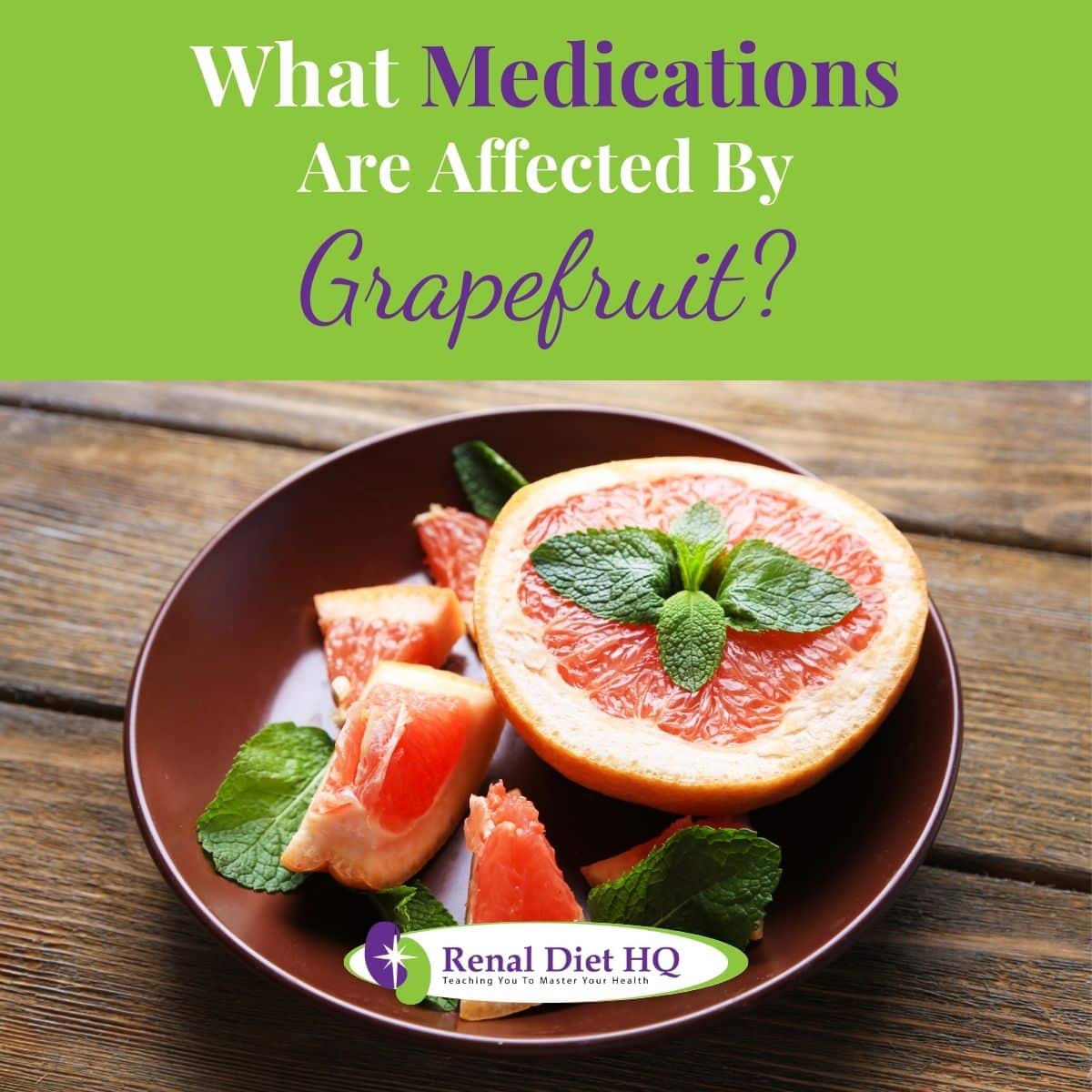
What Medications Are Affected By Grapefruit?
Types of drug interactions with this fruit can vary depending on the type of grapefruit-interacting drug.
A large amount of medications on the list that are affected by grapefruit or grapefruit juice ingestion and can affect your kidneys. The link to that list is here. Go there and check and see if you take any medications that are on the list.
The list contains medications that are anti-cancer agents, anti-diabetic agents, anti-infection medications, anti-inflammatory agents, antilipemic agents, cardiovascular agents, central nervous system agents, estrogen-containing medications, gastrointestinal agents, immunosuppressant agents, and urinary tract agents.
Other prescription medications with potential interactions include anti-anxiety medications, anti-seizure medications, antineoplastic drugs, and prostate enlargement medications.
In this article, we will look at statin drugs and calcium channel blockers, as they're two of the most commonly prescribed drugs for chronic kidney disease and diabetes.
Statins
Statins are often a necessary part of managing kidney disease, especially for patients with dyslipidemia or those at risk for cardiovascular disease.
Grapefruit is known to interact negatively with certain statin medications, making it important to monitor your intake as this fruit and its food products (like grapefruit juice) may interfere with medication effectiveness or increase potential side effects.
Proactive healthcare involves not only taking prescribed drugs but also looking into natural remedies and carefully monitoring drug dosage.
Consuming grapefruit can interact with the processing of certain statins like lovastatin, atorvastatin, and simvastatin. Hence, there may be higher levels of the medication in your body.
When there is more of the medication in your system, you are more prone to side effects including skeletal muscle tissue effects which can present with muscle pain and joint pain.
It's essential for those on statins to be aware of how grapefruit can affect their treatment plan, as well as being mindful about eating habits in general for a kidney diet plan.
Calcium Channel Blockers
In addition to statins, those with kidney disease may need to be mindful of calcium channel blockers when consuming grapefruit.
These medications are often prescribed for high blood pressure and other cardiovascular conditions, which are associated with having chronic kidney disease. Some of these drugs include amlodipine, nifedipine, felodipine, lacidipine, nicardipine, and verapamil.
When these grapefruit interacts with these medications, the result is a higher level of the drug in your blood. This can lead to excessively low blood pressure, swelling, abnormal heart rhythms, and fluid retention.
It's important for people with kidney issues to understand how diet impacts drug metabolism and interactions so that they can make informed decisions about what foods will help them maintain optimal health.
How Can I Avoid Interactions With Grapefruit?
Here are some quick tips on how to avoid unwanted medication interactions with grapefruit:
- Always check the labels on your medications to see if they have potential interactions with grapefruit. You will want to read labels carefully as a kidney patient.
- Ask your doctor or pharmacist regarding possible interactions if you are not sure.
- Do your own research on potential interactions. Make sure you’re aware of any potential problems that could arise from eating grapefruit while taking your medications.
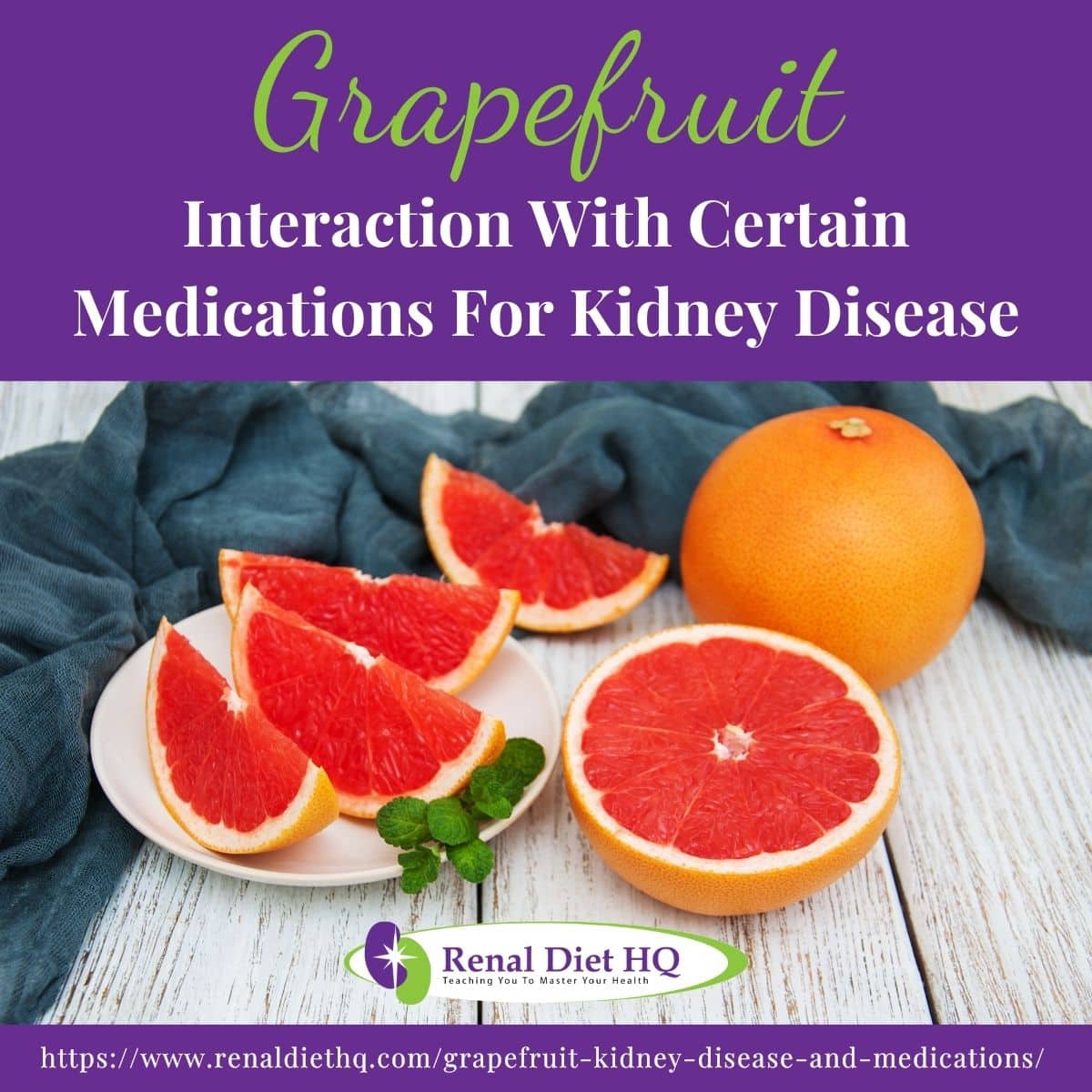
Check Medication Labels
When considering how to avoid grapefruit interactions with certain medications for kidney disease, it's important to read the labels of your drugs very carefully.
Pay close attention to the medication dosages and any warnings about drug interactions that could be affected by consuming grapefruit or its juice. This can be found in product monographs or patient information leaflets.
As a general rule, if you're taking any kind of medicine for kidney function and other medical conditions, always consult with your doctor before eating grapefruit or drinking a glass of grapefruit juice as it can interfere with how the body processes some drugs.
Be sure to ask your healthcare provider what other foods might interact with your medicines so you can make informed decisions when it comes to diet and nutrition while maintaining optimal health.
Taking these steps will help ensure that all of your treatments are effective and safe as you manage a chronic condition like kidney disease.
Ask Your Doctor
Asking a doctor about grapefruit interactions is an essential step in preventative care. Doing so helps ensure that patients are properly educated on the potential side effects of consuming this citrus fruit while taking certain medications for kidney disease.
Your physician can provide valuable insight into lifestyle changes, dietary advice, and medication regimens to help avoid any unwanted reactions or issues. In addition, they may be able to suggest alternative therapies if needed in order to achieve optimal health outcomes.
Taking these steps will not only give you peace of mind but also allow you greater control over your healthcare journey as you explore new ways to manage your chronic condition successfully.
Research Interactions
Considering the potential interactions with grapefruit, it’s important to do your research before you start consuming this citrus fruit.
Doing your research gives you a background on how these interactions can take place. However, this does not replace valuable medical advice from your physician.
By discussing these topics with your doctor, you can become more informed about what options are available to you in order to avoid any unwanted reactions or issues.
What Should I Do If I Experience Symptoms Of An Interaction?
Can diet improve ckd symptoms? If you experience any symptoms of a grapefruit interaction with certain medications for kidney disease, it's important to seek medical help right away.
Monitor any changes in your symptoms and report them to your doctor, as this could indicate a dangerous reaction.
Your doctor can help determine the best course of action for your particular situation.
Seek Medical Help
It's frightening to think that something as simple as grapefruit can cause serious side effects when taken with certain medications, especially if you're taking medication for kidney disease.
Unfortunately, it's not always easy to know whether it is grapefruit or something else that is causing your serious symptoms. This makes seeking medical help essential.
Finding specialists with experience in this area such as your kidney doctor can be helpful in identifying potential risks associated with particular foods and medications. They can also provide guidance on managing any possible side effects.
If you are experiencing troubling symptoms and side effects, it is best to seek emergency care so you can be evaluated and treated accordingly.
In short, getting professional help is key when dealing with potentially dangerous interactions between foods and medicines. Yes, there are commonly prescribed medications for CKD to know about.
Monitor Symptoms
It's important to be vigilant when it comes to monitoring your symptoms, especially if you are taking medication for a chronic illness.
Not only does this help ensure that the dosage is correct and any potential drug interactions are identified early on, but regular monitoring also allows for opportunities to make appropriate diet modifications and lifestyle changes as needed.
Keeping track of any side effects can alert us to possible problems before they become more serious - making sure we get the care we need in order to stay healthy. Be sure to report any symptoms to your doctor as these could be signs of something more serious.
It takes some extra effort, but by being aware of your symptoms and side effects and working closely with a healthcare provider, we can take proactive steps towards protecting ourselves from potentially dangerous drug interactions.
Are There Any Other Foods That Interact With Medications?
Strawberries, grapes, garlic, onion, broccoli, spinach, kale, citrus, nuts, fish, dairy, alcohol, caffeine, chocolate, and sugar - all these foods can potentially interact with medications.
Is ginger and garlic good for kidney? Similarly, garlic and onion can interact with blood thinners.
Broccoli, spinach, and kale can interfere with certain thyroid medications.
Lastly, nuts, fish, dairy, alcohol, caffeine, chocolate, and sugar can affect medications for diabetes.
Strawberries
Are strawberries kidney friendly? Strawberries are a delightful sweet and tart fruit that can be enjoyed by almost everyone. Whether you’re eating them fresh, frozen or canned, they make for an easy snack full of nutrition.
From smoothies to salads, strawberry recipes abound so it's easy to fit these into your daily diet. Not only do strawberries provide fiber and vitamins A & C but also have disease fighting antioxidants like polyphenols which help protect against chronic diseases like heart conditions and type 2 diabetes.
However, it’s important to be aware of potential medication interactions that strawberries can cause.
If you are taking blood-thinning medications, aspirin, anticoagulants, antiplatelets, or Nonsteroidal anti-inflammatory drugs (NSAIDs), it is important to be wary of your strawberry consumption as this fruit can increase the adverse effects of these medications.
Grapes
Grapes are another delicious fruit that can interact with medications.
Grown in vineyards, grape harvesting is an age-old tradition with a variety of different grapes used for wine production and juicing - all while providing nutrition to their consumers.
They’re packed full of nutrients like vitamin C, potassium, and fiber so you’ll get plenty of health benefits when you snack on them.
However, this fruit can affect the liver enzymes that break down drugs. In effect, it can cause quicker metabolism of some drugs, making them less effective in exerting their intended effects.
Substantial levels of consumption of grapes can cause clinical effects related to the drug it interacted with.
FAQs for Grapefruit Kidney Disease and Medications
What Are The Symptoms Of A Grapefruit-Medication Interaction?
The symptoms associated with a grapefruit-medication interaction will depend on the kind of drug that interacted with this fruit. For example, interaction with statin can cause muscle pain due to skeletal muscle toxicity while that with calcium channel blockers can cause extremely low blood pressure.
Other possible symptoms of a grapefruit-medication interaction include nausea, dizziness, fatigue, headaches, and difficulty sleeping.
To reduce the risk of developing these symptoms, talk to your doctor about potentially eliminating or avoiding frequent consumption of grapefruit products while taking medications for kidney disease.
Avoidance of grapefruit juice, fresh grapefruit, or other products such as grapefruit marmalade can be difficult, but it's essential for protecting your kidney function and minimizing drug interactions.
Talk to your doctor about changing your dietary habits of modifying your drug regimen with alternative medications to decrease unwanted drug interactions.
Ultimately, by understanding how grapefruit interacts with certain medications for kidney disease and taking steps to avoid it through dietary and lifestyle adjustments, you can ensure that your body is functioning at its best and your adverse symptoms are kept at a minimum. It's possible to start improving kidney function with diet.
Before taking any over-the-counter medication or combining food items, check for drug interactions that could result from grapefruit intake.
An over-the-counter antihistamine like fexofenadine can have interactions with grapefruit, so it’s important to be aware of this.
Be sure to talk to your doctor if you have any questions about what foods and medications are safe when dealing with chronic kidney disease to avoid potentially dangerous side effects of medication interactions.
Grapefruit Interacts With Many Medications
Are you thinking "my doctor prescribed a renal diet?" More and more Americans are affected by kidney disease, so more and more are also taking medications to manage this condition.
As such, it's essential that we all take responsibility for understanding how different foods might interact with medications - particularly when it comes to something as popular as grapefruit!
If you can't avoid eating this fruit while taking certain medications, make sure to consult your doctor or pharmacist first before making any changes to your diet or drug regimen.





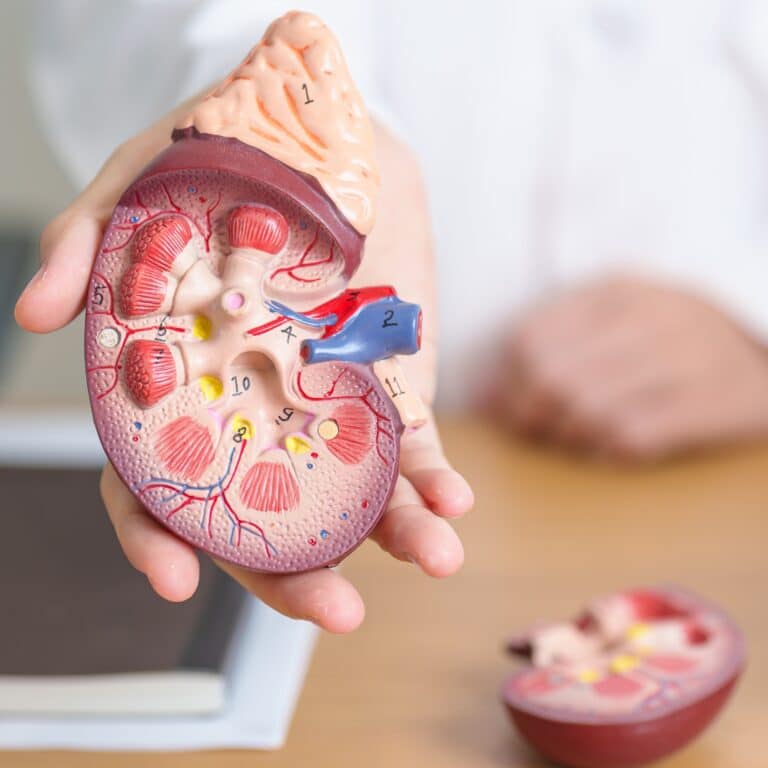
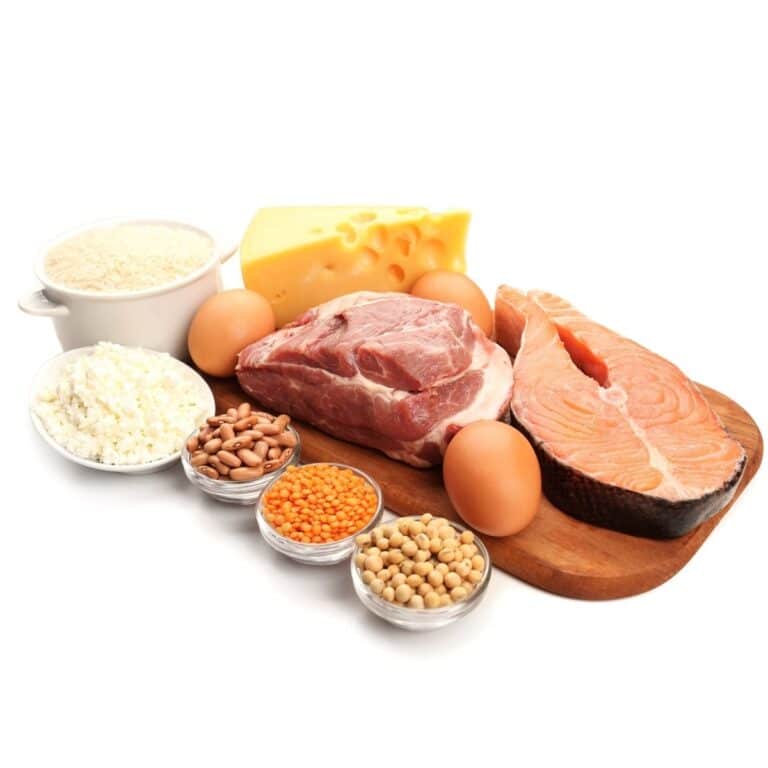



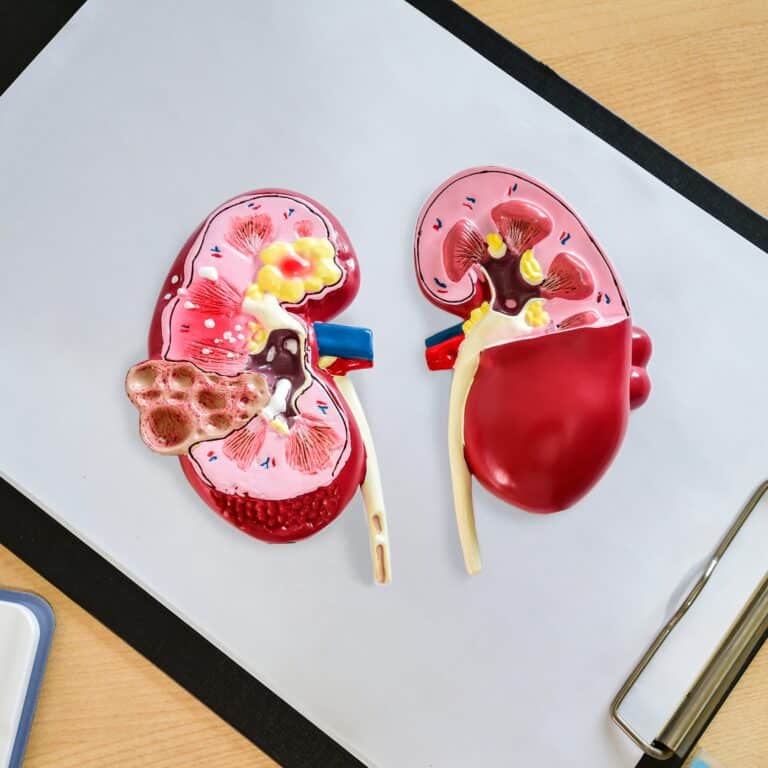



I s there a book that I can purchase about everything that I am reading?Computer is acting up.Thank you so much.
This is a good starting point: https://www.renaldiethq.com/kidney-diet-starter-kit/